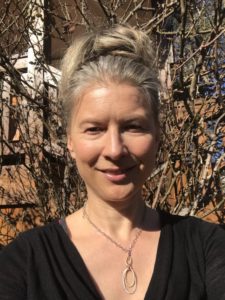CO-CHAIRS

Stefanie Hofer is an associate professor of German in the Department of Modern and Classical Languages and Literatures at Virginia Tech. She has published on contemporary German literature and cinematic depictions of Germany’s struggle to come to terms with Nazi atrocities and left-wing terrorism. Currently, she focuses on the role of autobiographical narratives in post-traumatic healing. Her work has appeared in scholarly venues such as American Imago, Film Criticism, film international, German Life and Letters, Seminar, and Women in German Yearbook.
Contact: hofer@vt.edu
CURRENT MEMBERS
Stephanie Arel is currently an Instructor at Fordham University. Previously, she was an Andrew W. Mellon Fellow at the National September 11 Memorial & Museum and a visiting researcher at New York University (2017-2019). She is the author of Affect Theory, Shame and Christian Formation (Palgrave Macmillan 2016) and co-editor of Post-Traumatic Public Theology (Palgrave Macmillan 2016) and Ideology and Utopia in the Twenty-First Century: The Surplus of Meaning in Ricoeur’s Dialectical Concept (Lexington 2018). She holds a certificate in treatment for trauma in the clinical setting from the New York Institute in Psychoanalysis, and her next book, Bearing Witness: The Wounds of Mass Trauma at Memorial Museums, will be published by Fortress Press in 2023.
Claudia Bacci is an associate professor at the Universidad de Buenos Aires (Sociology Department), and also postgraduate professor at Universidad Nacional de La Plata (History and Memory Master), Núcleo de Estudios sobre Memorias (“Gender in Memories”, IDES), and Universidad Nacional de Tres de Febrero (Gender Studies and Public Policies Master). She has published on testimonies about last Argentinian dictatorship at judicial and memorial scenarios. She is working now on the memory politics and connections between the human rights and feminist movements.
Tetiana Grebeniuk is a Professor of Department of Cultural and Ukrainian Studies of Zaporizhzhia State Medical University, Ukraine. The list of her publications along with teaching materials encompasses 127 works, including 1 monograph in sole authorship, chapters in collective monographs, scholarly articles, reviews etc. Her area of expertise includes memory and trauma studies, postcolonial studies; metamodern sensibility; cognitive and rhetorical narratology, transmedial narratology; contemporary Ukrainian fiction. Specifically, she is interested in cognitive processes while reading memory fiction and trauma fiction, and cognitive prerequisites of identity shaping.
Idit Gil is associate professor and academic director of the M.A program of Interdisciplinary Democratic Studies at the Open University of Israel. She is a historian on the Holocaust. Her research focuses on collective memory, testimonies, Israel and the Holocaust and Polish Jews. She was a fellow at the United States Holocaust Memorial Museum and received a grant from the Israeli Science Foundation for her work on forced labor. She has published a book: The Holocaust: Between the Personal and the History (Carmel, 2017 [Hebrew]).
Arleen Ionescu is Tenured Professor of English Literature and Critical Theory at Shanghai Jiao Tong University. Her major research interests are in the fields of modernism, Critical Theory, Memory Studies, Holocaust Studies and Trauma Studies. She has published in academic journals such as Journal of Modern Literature, Memory Studies, Oxford Literary Review, Parallax, Partial Answers, SLOVO, Style. She is joint-editor-in-chief (with Laurent Milesi) of Word and Text. Her books include The Memorial Ethics of Libeskind’s Berlin Jewish Museum (2017) and Arts of Healing: Cultural Narratives of Trauma (co-edited with Maria Margaroni, 2020). At present she is working on a book project on Shanghai Jewish refugees’ exile narratives (the Shanghai Ghetto).
Jocelyn “Joyce” Martin holds a PhD in languages and literatures and specializes in Literature and Memory Studies in Asia. She has published on dictatorships, cemeteries, and translation (Routledge); Memory Studies from Plato until today (Bloomsbury); and the vernacular as method (MSJ). A book on Memory Studies and the Philippines is a current project. Associate Professor at the Ateneo de Manila University and Managing Editor for Scopus-indexed Kritika Kultura for the last eleven years, she now teaches at the Université Catholique de l’Ouest. Advisory Board Member of the Memory Studies Association and former University of Ohio Zumkehr Lecturer, Jocelyn speaks five languages.
Caterina Preda, PhD is Associate Professor at the Department of Political Science, University of Bucharest where she teaches undergraduate courses on Latin American politics, Art and politics, and a graduate course on Cultural memory in South America and Eastern Europe. Her research is interdisciplinary and deals with art in dictatorships, artistic memory in post-dictatorships in South America and Eastern Europe (Chile and Romania), cultural memory, post-communism, Latin American studies, and the visual representation of the Roma. Her most recent book compares the relationship between art and politics during the dictatorships in Chile and Romania and was published by Palgrave in 2017. Her most recent research projects dealt with the case of the Romanian Artists Union (UAP), and the “Transregional remembrance of dictatorships: restoring human dignity through artistic practices in South America and Eastern Europe” (2018-2020), www.caterinapreda.ro.
Li Shir is a lecturer in English literature and a Renaissance scholar. She holds an MA in the Humanities from the University of Chicago, and a PhD from Tel Aviv University. Her doctoral thesis, entitled “Death in Sheep’s Clothing: Pastoral Poetics of Death from Arcadia to Auschwitz”, explored the connection between the pastoral genre of classical poetry and contemporary representations of trauma, particularly in literary and cinematic testimonials to the Holocaust. She continues to explore pastoral’s inherent relation to trauma and death in her own poetry and visual art.
Olga Ștefan was a fellow at Künstlerhaus Buchsenhausen for the year 2021-2022. She is a researcher, curator, and documentarian, and founder of The Future of Memory, transnational platform for Holocaust remembrance through art and media. A current PhD student in Sociology at the University A.I Cuza, Iasi, Olga Stefan is also the editor and author of the books The Future of Memory and Salva-Viseu 1948: Then and Now. www.thefutureofmemory.ro.
Jill Strauss PhD, teaches Conflict Resolution and Communications at Borough of Manhattan Community College (CUNY). Her research involves Restorative Practices and the visual interpretation of narrative and difficult histories. She incorporates virtual reality technology in her curriculum so that students can make visible hidden histories by creating monuments in augmented reality. This project has grown into a funded project in East Harlem/El Barrio to memorialize the community’s memories of the Covid-19 pandemic. Jill completed her PhD at Ulster University in Northern Ireland in 2010, where she designed an innovative fieldwork project integrating storytelling and visual art for empathy and validation as one way to address a history of mutual humiliation and historical conflict. Jill is co-editor of Slavery’s Descendants: Shared Legacies of Race and Reconciliation (Rutgers University Press 2019) along with other articles and book chapters.



